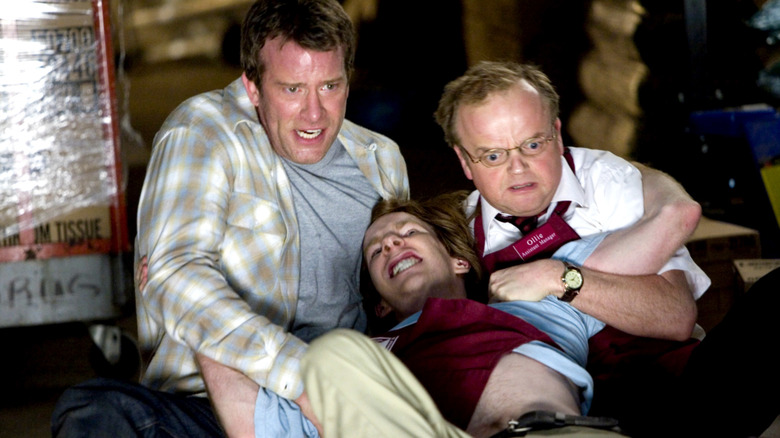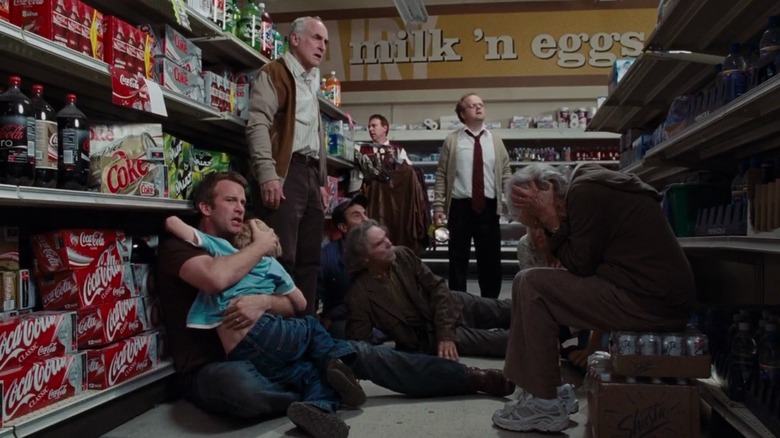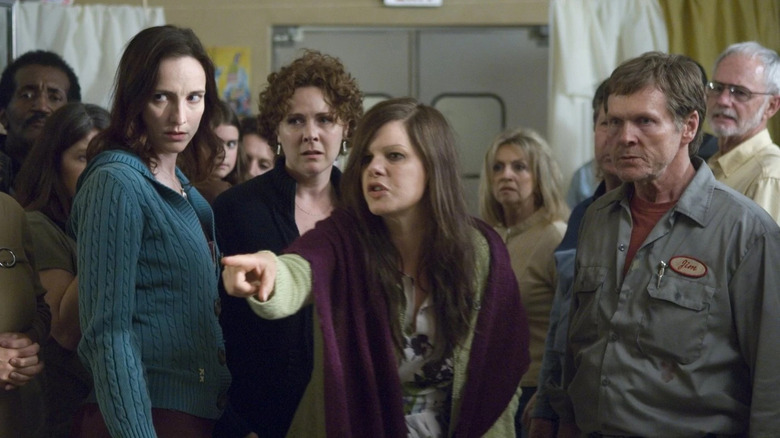Toby Jones Sees A Universal Theme Running Through The Mist
Imagine this scenario: You're shopping for groceries and all of a sudden you come across a 6-legged behemoth monster over 240 feet tall, two-story lobster-like creatures, and dog-sized spiders shooting corrosive webs at you. These are just a few of the creatures plaguing humanity in the 2007 film "The Mist." What's more frightening is that these out-of-this-world creatures aren't the scariest thing in the movie.
In "The Mist," the military accidentally opens a portal to another dimension, releasing a mysterious mist and deadly creatures on the town of Bridgton, Maine. Locals seeking refuge become trapped inside a grocery store, and quickly turn on each other in bids for their own survival. The film is a dire journey for the whole of its runtime before concluding with an infamous, brilliant, and agonizing ending that still hits like a gunshot.
Based on the Stephen King 1980 novella of the same name, it is easy to argue that "The Mist" is not a monster movie. A horror movie, sure, but it's a film where the terror doesn't stem from the inter-dimensional creatures but rather from those closest to you. Like, say, in aisle 9. The people trapped inside the supermarket are far scarier than anything King conjures up and pours through an interdimensional portal. It's a theme that one of the actors from the movie says is a universal one.
'You begin to feel this rhythm of people responding'
In "The Mist," Marcia Gay Harden plays religious extremist Mrs. Carmody. She leads an end-of-days group that wreaks havoc with all the best-laid plans of another group trapped in the supermarket. The tension mounts as a mysterious mist hides the identity of the monstrosities outside the store.
In a 2007 interview with Fangoria, Harden found the conflict inside the store more interesting than the monsters that lurked outside. "The Bible speech didn't strike a chord in me; the most interesting part was the 'Lord of the Flies' element," Harden said. "What do human beings do? What would I do?"
Toby Jones, who plays banal store manager Ollie Weeks in the film, saw a theme in the conflict between the people in the store. Jones said:
"This film is archetypal; it's not just about America. There are certain issues about this country you could point out, like the religious fundamentalism or whatever, but I believe it's archetypal in the sense that when one is stuck on a train, you begin to feel this rhythm of people responding. One person mouthing off, another person saying, 'Shut up,' another saying, 'Can we just calm down?', another person reading ... You begin to understand that a group of people responds, all over the world, in a very similar way."
It's a real "The call is coming from inside the house" sentiment, and it's a Stephen King calling card.
The real terror was inside the whole time
"The Mist" shows how quickly groupthink can go from productive to dangerous. While the threat outside grows, Mrs. Carmody continues to recruit allies. As any good cult leader would, she uses every unfortunate event as proof of her righteousness. In one particularly terrifying scene, Mrs. Carmody works her followers into a frenzy and then "sacrifices" a young soldier to the beasts outside.
The theme of man being scarier than a monster is a common thread among Stephen King stories, and it's one that director Frank Darabont stayed true to in "The Mist." He should know, he's directed enough King material. For the uninitiated, Darabont also directed "The Green Mile" and "The Shawshank Redemption," which both explore the human condition inside prison walls.
While prisons serve as an antagonist in both films, it's characters like Percy Wetmore and Warden Norton that truly made the prisons hellholes. "The Mist" does the same thing, just in a different kind of prison. In a 2007 appearance on Nightline, King admitted that he drew on reality to write Mrs. Carmody's character. The author said:
"To begin with she's sort of a figure of fun. Because everybody's pretty well solemnly grounded, and nobody's worried about anything. But once the disaster strikes, Mrs. Carmody gets a weird power. And certainly, we've seen this time and time again in our own lives, that as the situation worsens, in various parts of the world, the religious fanatics have a tendency to become more and more powerful."
Now I'm not saying that alien monsters are about to cascade through a fabric of space and/or time, but King did note that events from his earlier works — specifically "The Running Man" and "Rage" — have come true. So, you know, just be aware of your surroundings on your next trip to the supermarket.


